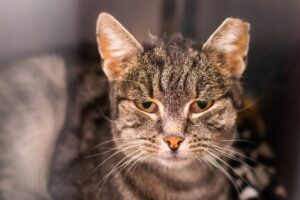
In infected cats, feline immunodeficiency virus (FIV) weakens the immune system, exposing the cat to many other infections.
In infected cats, feline immunodeficiency virus (FIV) weakens the immune system, exposing the cat to many other infections. It is similar to HIV (the cause of AIDS in humans) in that it attacks the immune system. Let’s explore this topic more below.
What is Feline Immunodeficiency Virus?
Feline immunodeficiency virus is one of the more prevalent and consequential feline infectious diseases worldwide. Even though cats infected with FIV might appear normal for many years, they often eventually suffer from immune deficiency. This usually allows harmless viruses, bacteria, fungi, and protozoa found in the daily environment to cause severe illnesses. Although FIV is incurable, recent studies have shown that cats with this virus commonly live average life spans as long as they are not infected with feline leukemia virus.
Transmission
The primary transmission mode for feline immunodeficiency virus is through bite wounds from a cat who is infected. Casual, non-aggressive contact, like mutual grooming or sharing water bowls, isn’t an efficient way of spreading the virus. Consequently, cats in households with stable social structures are less likely to acquire FIV infections. Also, sexual contact is not the main way to spread FIV among cats.
FIV-infected cats do exist globally, but the prevalence of infection differs significantly. The best way to minimize risk is to limit contact with cats who might be infected with the disease by keeping them indoors and testing all cats within the household.
Clinical Signs
There are three phases of infection with feline immunodeficiency virus: acute, asymptomatic (or latent), and progressive.
- In the acute phase, the virus spreads to other lymph nodes throughout the body, leading to temporary lymph node enlargement. This is often accompanied by depression, fever, and lack of appetite.
- After the acute phase, cats will enter an asymptomatic phase, which might last for months to several years. Infected cats might demonstrate blood work abnormalities, like increased blood proteins or low white blood cell levels. Some felines will remain in this stage and never progress to more severe disease.
- Cats will enter a progressive state during which secondary infections might occur. This may include chronic or recurrent infections of the eyes, skin, upper respiratory tract, or urinary tract. Seizures, weight loss, and neurological and behavioral disorders are all possible.
Diagnosis
It is critical that the FIV status of all cats be diagnosed when they are first acquired. Blood samples are taken to run a simple test during an appointment to determine the presence of antibodies to the virus. A negative antibody exam indicates that the cat hasn’t produced antibodies against the FIV virus. If exposure is possible, cats should be retested after at least three months to receive an accurate result. A positive test result means the cat has been infected with the virus. A second test, either a western blot or immunofluorescence, should be performed as confirmation.
Treatment
Unfortunately, there is no cure for feline immunodeficiency virus. But it’s critical to realize that cats with FIV can live healthy lives every day for many years. The prognosis is less favorable once an infected cat has experienced one or more critical illnesses due to infection or if persistent weight loss or fever are present. Close monitoring and vigilance of the health and behavior of FIV-infected cats is more important than it is for uninfected felines.
HERE AT MOUNT CARMEL ANIMAL HOSPITAL, WE’LL TREAT YOUR PETS LIKE FAMILY!
Mount Carmel Animal Hospital has been serving the Northern Baltimore/Southern York community for over 30 years and is proud to be an independently operated, small animal practice committed to excellence in veterinary medicine and client service. From grooming to wellness services, along with Canine Life Skills Training Courses, and surgical procedures, we have the expertise that will best serve the needs of you and your pet. Contact us at 410-343-0200 and follow us on Facebook
